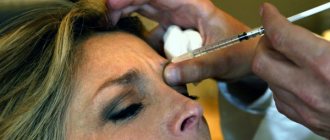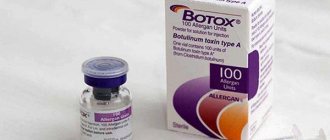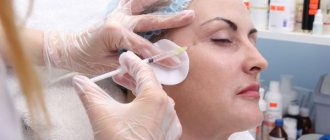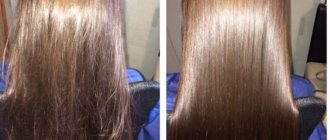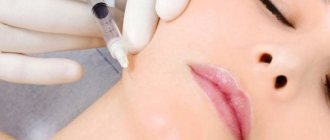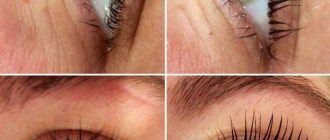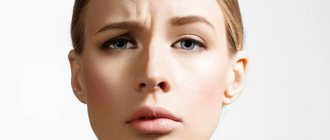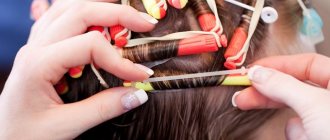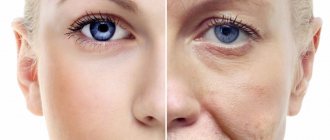Features of drugs and causes of allergies
Botox and its analogues contain botulinum toxin type A. Statistics say that poor sensitivity to this substance occurs in a small number of people. In this case, the administration of even a small dose of the drug causes muscle paralysis. There is no evidence that injections of the drug can cause an allergic reaction. But similar problems may be associated with excipients contained in the drugs:
- original Botox, Relatox and Botulax contain a certain amount of human protein albumin;
- Dysport also consists of albumin and lactose.
Under the influence of these components, people with hypersensitivity develop a full-fledged allergic reaction. It has a mild course, but can affect the appearance and general condition of the body.
All modern Botox preparations must be diluted to a lower concentration by a specialist before administration. To do this, you should use only saline solution.
But inexperienced cosmetologists sometimes add lidocaine to the product. Such experiments sometimes lead to serious consequences, including anaphylactic shock.
There is also a lot of lidocaine contained in the cream, which is often applied before the injection to reduce discomfort. In this case, an allergy to Dysport and other Botox preparations may actually occur.
But botulinum toxin itself is not allergenic and is safe for health in small doses. Increased sensitivity is associated with auxiliary components, violations of the rules for preparing injections, and low qualifications of the cosmetologist.
Can you be allergic to Botox for hair and eyelashes?
An allergic reaction to Botox injections is considered extremely rare. This condition is caused not by the toxin itself, but by the protein stabilizers and other substances included in its composition. To understand whether there may be an allergy to Botox, you need to know what substances can trigger it:
- albumin – human protein;
- lactose;
- sucrose.
Allergies to these components may occur in those who have hypersensitivity or individual intolerance to them. Another ingredient that can cause an inadequate reaction in the body is Lidocaine. It is not included in the original composition of the drug, but is used to reduce its concentration or for local anesthesia of the skin.
Moreover, an allergy to Botox can occur even when used on hair and eyelashes. This reaction of the body is even less common than with classic injections, but it still occurs.
We recommend reading about the Botox facial procedure. From the article you will learn about what Botox is, indications and contraindications for using Botox on the face, and facial care after the procedure. And here is more information about complications after Botox.
Indications and contraindications
Dysport is allowed to be administered from the age of 18. To eliminate facial wrinkles, it can be used up to the age of sixty-five. At the same time, injections are allowed for both women and men.
The drug is recommended:
- for facial wrinkles;
- if your palms, armpits and other parts of the body sweat excessively;
- for diseases associated with impaired muscle tone.
But it is important to remember that the procedure has contraindications that must be taken into account. These drugs are prohibited:
- with individual intolerance;
- if there are diseases associated with blood clotting disorders;
- with muscle weakness;
- for chronic lung pathologies;
- for disorders of the endocrine system;
- during the period of bearing a child and breastfeeding;
- during menstruation;
- during periods of exacerbation of any disease;
- after surgical interventions;
- for dermatological diseases;
- while using certain medications.
Injections are considered a medical procedure, so they should only be performed by the attending physician after a detailed examination.
Treatment
If the symptoms are local, there is no need to worry. However, you need to make sure that the complication is really not very serious.
To recover from the onset of local symptoms, it is usually sufficient to use suitable medications for a while. In more complex cases, you should immediately consult a doctor.
First aid is as follows:
- Apply something cold to the injection site. After this, the vessels will narrow, as a result of which the swelling will significantly decrease.
- Take an antihistamine.
- Ventilate the room. Fresh air can improve the condition of a person who has an allergic reaction.
- Call a doctor as soon as possible.
- If the case is very severe, use a hormonal agent that suppresses the immune response. This is, for example, Dexamethasone or Prednisolone.
What to do
It has long been believed that an allergic reaction to Botox cannot occur. But this opinion was refuted.
Expert opinion
Allergist Yulia Borisovna Cherkashina
Education: Medical University named after. N.I. Pirogov, Moscow, 1998
The drug has been used relatively recently, so not much information has been collected about it.
Even if there is no allergy, some time after the administration of the medicine, paralysis of the facial muscles develops. Because of this:
- facial expressions are disrupted and motor activity of the facial muscles worsens;
- weakness is felt in the muscle layer of the head;
- The trophism of the skin is disrupted, so it becomes dry and flabby.
Such adverse reactions can occur over a long period of time and very often do not go away.
If an allergy to Botox injections is expressed by local symptoms, then it is possible to manage only with antihistamines in tablet form. But first you need to convince yourself that there are no more serious complications.
Usually Suprastin, Claritin, Loratadine are used to relieve allergic manifestations.
If anaphylactic shock or Quincke's edema develops, the patient must be provided with medical assistance immediately. Such reactions occur in very rare cases. They are usually provoked by the use of lidocaine. Therefore, the patient should warn the cosmetologist in advance about intolerance to this drug.
But, if such side effects begin to appear, you need to know how to provide first aid to the victim. In this situation, the patient should immediately tell the doctor about the deterioration in health, since the first symptoms appear during the injection process. After this, the doctor should:
- give the patient an antihistamine;
- apply ice to the treated area to constrict blood vessels and reduce swelling;
- open the windows to allow fresh air into the room;
- call an ambulance.
Symptoms
It happens that the immune system considers substances administered during injections of Botox, fillers, mesotherapy, etc., to be foreign elements. Then the body’s defense mechanisms turn on in the form of an allergic reaction. The manifestations of allergies and their intensity vary from person to person and depend on the state of the immune system, as well as a number of other factors.
An allergy to Botox can manifest itself with the following symptoms:
- redness, pain, severe swelling in the area where the drug was administered;
- increased body temperature, chills;
- peeling of the skin, itching, rash, urticaria, burning sensation of the skin;
- increased lacrimation, difficulty swallowing or breathing, cough, shortness of breath;
- general weakness, nausea, gastrointestinal disorders, dizziness, headache;
- difficulty moving the lips, sometimes difficulty speaking due to discomfort in the nasolabial triangle;
- unnaturally lowered or, conversely, raised eyebrows and eyelids;
- tachycardia, decreased blood pressure.
The most dangerous is Quincke's edema - a dangerous reaction that can lead to anaphylactic shock, requiring urgent medical attention. Fortunately, this manifestation is extremely rare.
Symptoms of an allergy to Botox and fillers can occur a few minutes after injections, or at home, for several hours and even days after the session. Minor manifestations of hypersensitivity do not require treatment; the use of antihistamines Suprastin, Erius, Tavegil, Zodak, Cetrin or others is sufficient.
❤
Preventive actions
Whether you are allergic to Botox or not is of interest to everyone who has decided to undergo Botox injections. It is impossible to determine the likelihood of developing a negative reaction of the immune system, but to reduce the risk, adhere to the following recommendations:
- The number of people who developed unpleasant symptoms after botulinum toxin injection is small. Usually, symptoms appear that are not life-threatening and gradually go away on their own. Therefore, those who have never had allergic reactions to any substances do not need to perform preventive procedures before the session.
- It is important to find out in advance how the body reacts to Lidocaine, since it is under the influence of this drug that anaphylactic shock and Quincke's edema develop. To make the procedure as safe as possible for health, you need to tell the cosmetologist to use other anesthetics.
- People who have previously experienced hypersensitivity to Botox, even with mild manifestations, should refrain from administering the drugs until the allergen is accurately identified. Otherwise, the symptoms of hypersensitivity will intensify with each injection. The first time, the injection site only turns red and swells, but in subsequent sessions the reaction will be more severe.
- To determine the component that causes a negative reaction in the body, skin tests are performed. After receiving the results of the study, patients are selected the safest means. For example, if a person is lactose intolerant, then Dysport is contraindicated for him, and if he is hypersensitive to albumin, Lantox is allowed.
- In extremely rare cases, there are allergies to drugs containing Botox. But, if there is an individual intolerance to botulinum toxin type A, injections should be completely eliminated as a method of wrinkle correction. Instead, it is better to perform hardware skin tightening or use fillers with hyaluronic acid.
Only through timely diagnosis can we determine which components cause the allergic reaction and choose a method to eliminate it.
Thanks to a competent approach to performing injections, a correctly determined dosage of the drug, highly qualified doctor and patient compliance with recommendations during the rehabilitation period, dangerous complications can be avoided.
How can I remove it?
Local skin manifestations are quickly eliminated by contact with cold. The vessels narrow, microcirculation is limited. The injected components are localized in the injection area. Skin sensitivity decreases. For severe itching, it is recommended to take antihistamines Cetrin, Loratadine, Suprastin, Tavegil. One of the drugs will definitely be found in your home medicine cabinet. It is imperative to ensure a flow of fresh air, it is advisable to call an ambulance.
A medical team will conduct an examination; if a severe form of the immune response is detected, hospitalization is possible. The patient is given antihistamines, in extreme cases hormonal - Prednisolone, Dexamethasone. Serious problems with the heart can be treated with sedatives and blood pressure normalized.
Allergies are insidious, and self-medication is dangerous. When deciding on Botox injections, it is important to immediately find out the name and composition of the drug containing neutrotoxin. Patients learn about intolerance to painkillers long before visiting a cosmetologist.
How to do an allergy test
The skin test is a very effective method for determining whether you are allergic to Botox. The specialist conducts it as follows:
- First you need to lightly scratch the patient's hand. Then the specialist injects a small amount of a product into this wound, which includes botulinum toxin.
- If an allergic reaction occurs, swelling and redness will be noticeable on the skin within 60 minutes.
In cases where the test result is positive, it is performed several more times, using different drugs based on botulinum toxin. So, in the end, it turns out to find out which element a person is allergic to.
Causes and methods of diagnosis
A professional cosmetologist who values his reputation will not give Botox injections immediately when a patient requests a service. First of all, the doctor determines the indications and contraindications for botulinum therapy, finds out whether there have been cases of allergic reactions in the past and to what, whether Botox was previously administered and how the body reacted to the drug.
A simple skin test, which can be performed in almost any cosmetology salon, helps to accurately determine the possible development of an allergy to products containing botulinum toxin:
- A small cut in the form of a scratch is made on the clean skin of the wrist. 2-3 drops of the Botox preparation chosen for the correction of wrinkles are dripped into it;
- Changes in the skin are assessed within an hour. With increased hypersensitivity, swelling and hyperemia, rash and itching appear at the injection site.
If an allergy is confirmed by a skin test, similar tests are carried out for other drugs with a neurotoxin. This makes it possible to understand exactly what irritant the body reacts to with hypersensitivity, which subsequently helps to select a harmless agent for botulinum therapy.
Testing for the possible occurrence of allergies when Botox is injected under the skin is not always considered a mandatory procedure, since there are not many real cases of an allergic reaction to botulinum toxin.
But this test must be carried out in cases where:
- There has been a history of hypersensitivity reactions to injectable drugs, especially anesthetics;
- The patient is prone to allergies of any type.
POPULAR WITH READERS: Allergy to anesthesia in dentistry, symptoms, treatment
Cosmetologists cannot refuse a test for sensitivity to Botox, and if the client himself wishes to conduct testing before the procedure. Therefore, for safety reasons and if you have doubts about the capabilities of your body, it is advisable to always undergo a sensitivity test before botulinum therapy; this will save you from many problems.
In addition, we should not forget that there are contraindications in which the administration of Botox even in minimal doses is not advisable.
These include:
- All trimesters of pregnancy and breastfeeding;
- Infectious diseases;
- Malignant processes in the body;
- The patient's age is under 18 years;
- Epilepsy and hemophilia;
- The period of treatment with antibiotics, sedatives, anticonvulsants and medications that affect the blood coagulation system. At least 2 weeks must pass from the last time you took these medications to the botulinum toxin injection procedure;
- Dermatitis.
With the above conditions and diseases, the functioning of the immune system deteriorates, hormonal levels and the course of metabolic reactions change, which can give rise to the occurrence of hypersensitivity.
Botox injections are not recommended for people over 45 years of age. The thing is that with age, muscles naturally relax and neurotoxin can worsen this condition, which negatively affects the cosmetic effect.
